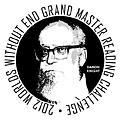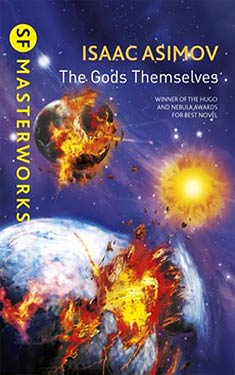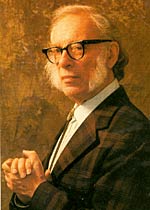GMRC Review: The Gods Themselves by Isaac Asimov
 Jeremy Frantz (jfrantz) reviews SF/F books on his blog The Hugo Endurance Project where he has given himself just 64 weeks to read every Hugo Award winner. This is his eighth GMRC review to feature in the blog and the second one this month.
Jeremy Frantz (jfrantz) reviews SF/F books on his blog The Hugo Endurance Project where he has given himself just 64 weeks to read every Hugo Award winner. This is his eighth GMRC review to feature in the blog and the second one this month.
 Separated into three different but parallel stories, The Gods Themselves begins when scientists have discovered a way to exchange energy with another universe, the para-universe. Things get dicey when what is at first possibly the single greatest scientific achievement in history, threatens to become a horror story as it is understood that not only the two universes exchanging energy, but also physical laws which could result in our sun going nova.
Separated into three different but parallel stories, The Gods Themselves begins when scientists have discovered a way to exchange energy with another universe, the para-universe. Things get dicey when what is at first possibly the single greatest scientific achievement in history, threatens to become a horror story as it is understood that not only the two universes exchanging energy, but also physical laws which could result in our sun going nova.
Eternal contemporaneity
Published in ’72, winner in ’73, this is another title that it seems difficult to separate from the public scientific discourse of its time. The early 70’s marked the passage of some of the most monumental environmental protection regulations in American history. I saw The Gods Themselves very clearly drawing on the experience of environmental and consumer protection messages being hashed out on the national political stage. But before I’ve got you thinking this is a book about vast conspiracies and coordinated cover-ups, rest assured Asimov elevates his discussion to broader epistemological concerns and again draws on the sentiment of the times as he pulls in questions that, given the 1962 publishing of Thomas Kuhn’s, The Structure of Scientific Revolutions, spoke to the very heart of the philosophy of science in his day.
Where Asimov approaches the masterful with The Gods Themselves, is not just the incorporation of some pretty elusive and theoretical subject matter, but in that he makes it genuinely fun and doesn’t ever come off overly-intellectual or supercilious (not that Kuhn’s thoughts on non-linear paradigm shifts and the role of subjectivity/objectivity in science aren’t fun). Without much thought, this could be a pretty great weekend read, but a little more attention also turns up some steamy philosophizing too. Sure, Asimov touches on elements of Kuhn’s Scientific Revolutions, but I also found The Gods Themselves was especially poignant in an age of vehement and politically motivated skepticism.
“Oh, it was turning sour anyway. It’s lasted long enough. What bothers me more—much more—is that he violently refuses to accept your interpretation of the Pionizer experiments you ran after the surface observations.”
“I told you the way it would be.”
“He said he had seen your results.”
“He glanced at them and grunted.”
“It’s rather disillusioning. Does everyone just believe what he wants to?”
“As long as possible. Sometimes longer.”
Part 3 – Chapter 12
The Gods Themselves is also strikingly apropos of issues of privatization and commercialization of science which have been in the news rather frequently of late. England recently decided to give the entire country access to its top science journal and the arguments for the free and open sharing of all information and media – including science – seem to be gaining in popular appeal.
“An odd thought. But perhaps it was that the fewer who knew of your Intuitionism, the fewer would suspect your contribution to what would otherwise be put to his sole credit.”
Part 3 – Chapter 12
Being broken up into three parts, I was most attracted to this theme. The intrigue of trying to uncover scientific mystery whilst averting possibly serious calamity was really fun, and the juxtaposition of the separate struggles in the normal and para-universes with the same problem was great (even if Book II was something of an unneeded break).
 Asimov was also writing this just 10 years shy of the centennial of Henrik Ibsen’s, Enemy of the People, which was published 90 years earlier in 1882. In fact, I read this as a great update (intentional or otherwise) to the classic which so accurately portends the future struggles to be faced by environmental and consumer advocates of the 60’s and 70’s, and really enjoyed pulling out those connections. There are characters who just don’t want to believe the worst will happen. Those who refuse to believe the worst won’t happen, and those who set out to prove the worst could happen. Then of course there are the spineless media and politicians. In Asimov’s tale though, the scope has expanded by orders of magnitude. Instead of the threat of pollution that could ruin a growing town, Asimov has threatened the destruction of the world, the entire spiral arm of our galaxy to be exact. That the consequences couldn’t possibly affect us in our lifetime is big here and Asimov very clearly has little respect for those willing to externalize such consequences.
Asimov was also writing this just 10 years shy of the centennial of Henrik Ibsen’s, Enemy of the People, which was published 90 years earlier in 1882. In fact, I read this as a great update (intentional or otherwise) to the classic which so accurately portends the future struggles to be faced by environmental and consumer advocates of the 60’s and 70’s, and really enjoyed pulling out those connections. There are characters who just don’t want to believe the worst will happen. Those who refuse to believe the worst won’t happen, and those who set out to prove the worst could happen. Then of course there are the spineless media and politicians. In Asimov’s tale though, the scope has expanded by orders of magnitude. Instead of the threat of pollution that could ruin a growing town, Asimov has threatened the destruction of the world, the entire spiral arm of our galaxy to be exact. That the consequences couldn’t possibly affect us in our lifetime is big here and Asimov very clearly has little respect for those willing to externalize such consequences.
Recommendation
Now, having read every Hugo Award winner through 1979, this book felt very much a part of the genre. It is certainly not to say that The God’s Themselves was derivative or overly referential, but it recalled this or that from a number of the earlier winners and as I mentioned above, of non-SF titles too, and the effect was something akin to a pleasant reminiscence. I liked a lot about this book but pulled-up short of seriously falling in love with anything. I haven’t read much of Asimov, but this makes me want to read more.



















 Full Details
Full Details


10 Comments
Hmm, I have only read a couple of his early novels and I wasn’t much impressed. Maybe I should try this one.
I wouldn’t call it a smash hit but I’m not a huge fan of the Foundation series (the only other Asimov I’ve read) and this was significantly better. I wouldn’t necessarily go out of your way to read it, but if you’re in the mood for Asimov, it would probably be pretty satisfying.
I’m a gargantuan fan (freakish) of Foundation.
I enjoyed The Gods immensely. For me he does succeed in describing a haunting truth of Friedrich von Schillers’ original premise “… [a]gainst stupidity the gods themselves contend in vain…” as he potrays the stupidity often associated with blind scientific progress, and its concomitant academic envy. Even if it’s a bit of yarn, the positron pump can easily be exchanged with global warming and associated concerns.
Many people disagree with me, but I found the aliens quite riveting, and let’s be honest, it’s one of the best twists in science fiction. Can’t say that the prose about bear-breasted women on the Moon will necessarily endear him to the female audience, which – if rumors are to be believed (they probably are) – isn’t to dissimilar to Asimov’s general views about women.
The aliens were pretty good. It was a balancing act well played of giving us only as much information about them as absolutely necessary.
“bear-breasted women on the Moon…”
Now that is a grizzly image!
Nice job contextualizing this novel. It fits in with Asimov’s views on the importance of scientific rationality and reason, and his dedication to humanism, which were extremely important to him, and which had a big impact on SF readers by way of his fiction, non-fiction science columns in the SF magazines, and editorials.
Oops @Chris, well spotted. Of course it’s not that bear, but bare. English isn’t the first language. Nonetheless, both are probably equally disturbing on the Moon. Much like the three breasted prostitute appearing in both Total Recalls 🙂
I, too, was a big fan of Foundation. I use the past tense, because it has been 20 years. I really ought to read it again to make sure my tastes haven’t changed. It was the grand scope that did it for me. There was a lot of complexity for him to handle, and it seemed to me (at the time) that he kept it all in perspective.
Still, the more I hear about The Gods, Themselves, the more I am tempted to push it up my reading list.
Ha! When I originally wrote that I wasn’t a fan, I hadn’t finished the third book and though I’m not sure I loved it, I will amend my previous statement and say that I was converted in the end. 🙂
Sorry, the comment form is closed at this time.